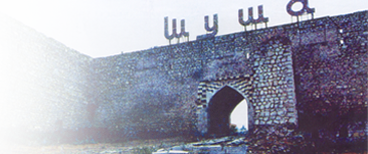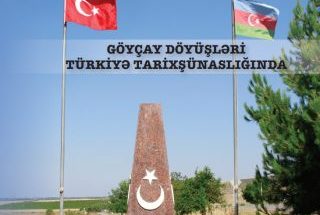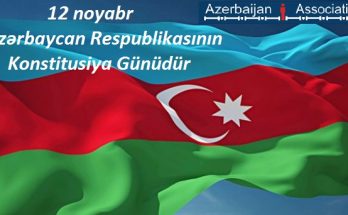 Chief of department on work with the law-enforcement bodies of Azerbaijan’s Presidential Administration Fuad Alasgarov has given an interview concerning Azerbaijan’s draft military doctrine.
Chief of department on work with the law-enforcement bodies of Azerbaijan’s Presidential Administration Fuad Alasgarov has given an interview concerning Azerbaijan’s draft military doctrine.
-The draft military doctrine is one of the most discussed issues. We had been waiting for this document for a long time. But the reaction to the draft doctrine is ambiguous, there are different comments and questions. We would like you to clarify them. Why did it take too much time to draw up the military doctrine?
-First of all I want to say that under the order of Azerbaijani President a working group on national security policy was set up in 2004 and this group started to draw up the national security concept. Mr. President confirmed the national security concept on May 23, 2007. This concept plays major role in drawing up the military doctrine, foreign policy strategies, concepts on economy, culture, science, education, health, transport etc. Taking this into account, the working group was commissioned to draw up the draft military doctrine and other documents envisaged in the national security concept. The question is a large work covering almost all the spheres of the country’s life. Mr. President has recently sent the draft military doctrine to the parliament.
The military doctrine is a serious document determining the conceptual framework of the military security system aiming to defend from inside and outside threats. At the same time the doctrine is a part of the national security concept. Drawing up such a serious document requires thorough development. Moreover, similar documents of various countries, their application in practice and the results were studied while drawing up the doctrine. It was important to choose the most optimal way for ensuring Azerbaijan’s military security.
-According to media reports, the doctrine does not show the allies and enemies, except Armenia, there is no concreteness in it. What can you say about it?
-Probably no one will deny that occupation of Azerbaijani territories by Armenia is a factor having negative influence on the country’s national security. Moreover, Armenia’s occupation is the major real military threat to our country. Therefore, this point has been unambiguously reflected in the draft military doctrine. As regards the allies and enemies, I want to say that there is such an approach in the draft doctrine. According to this approach, the country’s defense policy is determined irrespective of our sympathy for some states, but depending on the national interests of Azerbaijan and taking into account the threats to these interests. This approach – determining replies to calls – makes the doctrine flexible and long-lasting. This is very important.
As all analogical documents of several countries, Azerbaijan’s Military Doctrine shows that this document is open for specification and change reflecting dynamism of security atmosphere. Nevertheless, practice of other countries shows that conceptual documents, as well as military doctrines are renewed after sometime. This time interval is 5-10 years. Within this period doctrine stays as an adequate document. Assuming the permanent and lasting interests of the country as a basis gives opportunity to achieve it.
Moreover, it must be noted that, besides national security concept, military doctrine is also received as a basis for the preparation of other conceptual documents which will develop and specify strategic defense community and theses of the two documents in future. Generally, according to national security concept, Azerbaijan pursues multilevel foreign policy and is interested in establishment of friendly relations with all countries on the basis of well-known norms of international law. Otherwise, we are in interested in friendly relations with other countries.
-If we take into account recent incidents in the region, there are such opinions that yesterday’s partner may turn into enemy today as a result of geopolitical changes. From this point of view some commentators pretend that potential foreign threats must be shown in the military doctrine.
-Doctrine determines threats, military-strategic basis of military security, the direction and perspectives of military construction, the duties of Armed Forces in peace, war times and in times of real danger exactly. So, foreign military and political dangers – continuation of occupation of Azerbaijani territories by Armenian Armed Forces; possible foreign interfere in internal affairs of Azerbaijan; foreign military dependence; territorial pretensions by neighboring countries; activity directed to spoil of domestic political, social-economic stability, as well as support of separatists and religious-extremist movements, sending illegal armed groups to Azerbaijan by foreign states and preparation of terrorists, participation of neighboring countries in interstate conflicts, occurrence of other forms of internal conflicts, military operations, military revolt, military and military-political instability in the territories of those countries; violation of regional military balance, or overstep over the framework of military ability, as well as set up military bases near coastal waters and state borders of Azerbaijan, collecting of army groups and weapons, strengthening of other forms of military participation; violation of Azerbaijan’s state borders by military alignments and military groups, aggravation of border arguments or conflicts, spread of weapons of mass destruction and new military production technologies were determined in the draft.
-Issues on set up foreign military bases caused hot discussions. In what cases may military bases be set up in the Azerbaijani territories?
-According to draft doctrine, except international agreements jointed by Azerbaijan, set up military bases are forbidden in our territory. Nevertheless, Azerbaijan keeps right to allow temporary set up, or foreign military participation in its territory during military-political situation demanding radical change.
– For example during a war against Azerbaijan?
– Including it as well…
– Some people claim that integration into the European institutions was not shown as a strategic goal despite that there is such point in the National Security Concept. What can you say about that? How is the development of NATO-Azerbaijan relations?
– The military doctrine is a reproduction and element of the National Security Concept. A doctrine determining defense policy in peace time considers bilateral and multilateral military-political cooperation with the partner countries. Considering the united security principle and our region as a part of Euro-Atlantic space, Azerbaijan supports efforts toward establishing of security system in this space and as it was determined by the draft military doctrine, it will continue cooperation with NATO on the basis of mutual interests.
– You mentioned the directions and prospects of army-building. Can you give details?
– The military doctrine is a document based on present realities and directed to the future and therefore it attaches great importance to the prospects of army-building. Increasing of effectiveness of command and administrative structures of the armed forces and other military units, completion of the military units on the professional basis, learning of modern joint defense and offensive operations, increasing of effectiveness of coordination between the armed forces and other military units can be among the priority directions. The strengthening of social protection of the military servicemen should be emphasized as one of the priorities. The draft doctrine gives a significant role to the maintenance, formation and development of Azerbaijan’s Defense Industry Complex. Main directions of the development of Defense Industry Complex is securing of maximum possible independence of armed forces and other military units to meet their needs, sustainability of the Defense Industry Complex to the concurrency with the foreign markets and development of export capacity of our defense industry.
APA



